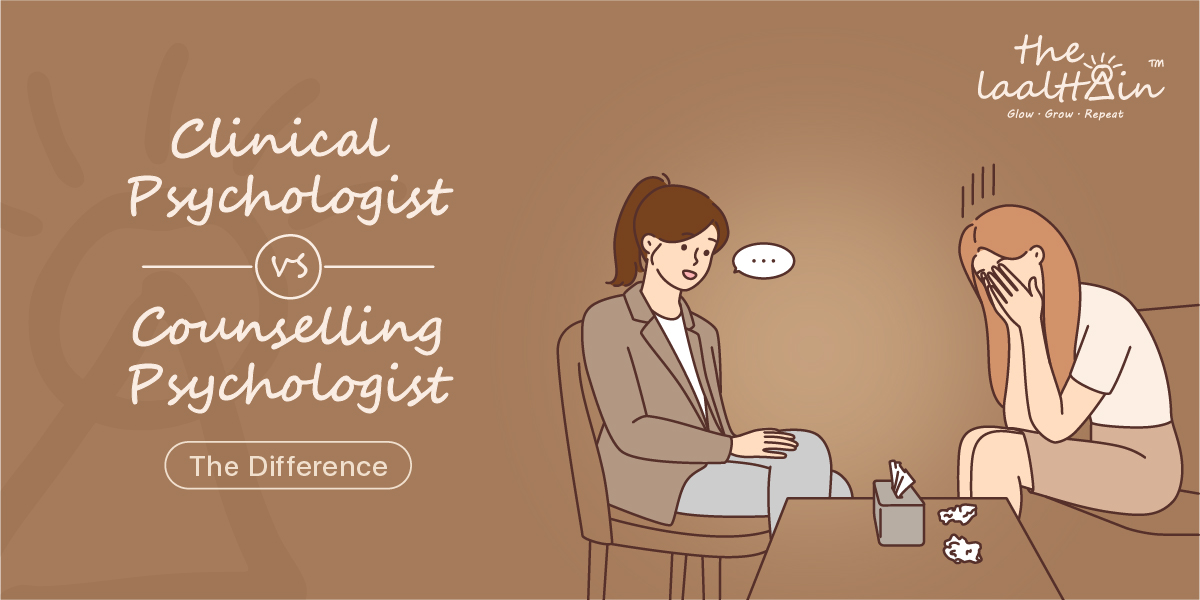
JUST LIKE VEGETABLE BIRYANI & PULAO AREN’T THE SAME, NEITHER ARE CLINICAL & COUNSELLING PSYCHOLOGISTS. SURPRISED? WE THOUGHT SO!
While both Clinical Psychologists and Counselling Psychologists work in the field of mental health, their roles, approaches, and areas of expertise are distinct. Clinical psychologists assess, diagnose, and treat mental health disorders using psychotherapy and evidence-based interventions, while also conducting research, providing consultations, and promoting mental well-being. To become a clinical psychologist in India, one needs to complete a Bachelor’s in Psychology (BA/B.Sc.), a Master’s in Clinical Psychology (MA/M.Sc.), and an M.Phil. in Clinical Psychology from an RCI-recognised institute, with an optional PhD for advanced roles.
Counselling Psychologists focus on helping individuals cope with life transitions, personal challenges, and emotional well-being. They guide people through stress, relationship issues, career struggles, and mental health concerns through talk therapy, providing support to improve well-being and promoting personal growth and self-awareness. To become a counselling psychologist in India, one needs to complete a Bachelor’s in Psychology (BA/B.Sc.), a Master’s in Counselling Psychology (MA/M.Sc.), and optionally pursue postgraduate diplomas or a PhD for advanced specialisation. Counselling psychologists, though well-qualified, if not licensed by the RCI, are not authorised to diagnose or treat severe mental disorders like schizophrenia or other psychopathologies.
Let’s Understand This Through Case Studies:
In a case where Raj, a 40-year-old man, seeks help for severe depression and suicidal thoughts, he would be treated by a clinical psychologist. The clinical psychologist would conduct a comprehensive assessment, diagnose his condition, and utilise therapies like Dialectical Behaviour Therapy (DBT) to address his complex symptoms and provide coping strategies. In contrast, Simran, a 25-year-old woman facing anxiety about her job and relationship issues, would benefit from a counselling psychologist. The counselling psychologist would help her develop coping mechanisms through person-centred therapy and solution-focused brief therapy, focusing on her immediate concerns and personal growth rather than diagnosing severe mental health disorders.
Often, people confuse the licensure of clinical psychologists with a sense of superiority, mistakenly believing they are inherently “higher” in rank than counselling psychologists. It is important to recognise that both clinical and counselling psychologists are essential in the field of mental health care, and their roles are not hierarchical but complementary. The key for a client is to seek the professional whose expertise aligns with their specific needs. Going to the right psychologist—whether clinical or counselling—ensures that the person receives the most appropriate support for their unique situation. This targeted approach will benefit them more than simply choosing a psychologist based on their licensure or title. Each type of psychologist offers valuable skills, and the right fit can significantly enhance therapeutic outcomes.
Another profession that is very important in this field is Psychiatry. A psychiatrist is a licensed medical doctor who can diagnose mental health disorders and prescribe medication. Similar to an orthopaedic surgeon treating injuries and a physiotherapist rehabilitating patients, psychiatrists and psychologists work together. For instance, a psychiatrist may prescribe medication for severe anxiety, while a psychologist provides therapy to help the patient develop coping strategies, creating a holistic approach to treatment.
In Summary:
- Clinical Psychologists: Specialise in diagnosing and treating severe mental health disorders through assessments and therapeutic interventions.
- Counselling Psychologists: Focus on helping clients manage everyday life challenges, personal growth, and stress, without diagnosing severe conditions.
- Psychiatrists: Medical doctors who diagnose mental health conditions and can prescribe medication as part of treatment.
- No Hierarchy: Both clinical and counselling psychologists are equally important, and the best results come from choosing the right professional based on your specific needs.
- Collaborative Approach: Psychiatrists and psychologists often work together, combining medication and therapy for comprehensive mental health care.


Hi, this is a comment.
To get started with moderating, editing, and deleting comments, please visit the Comments screen in the dashboard.
Commenter avatars come from Gravatar.